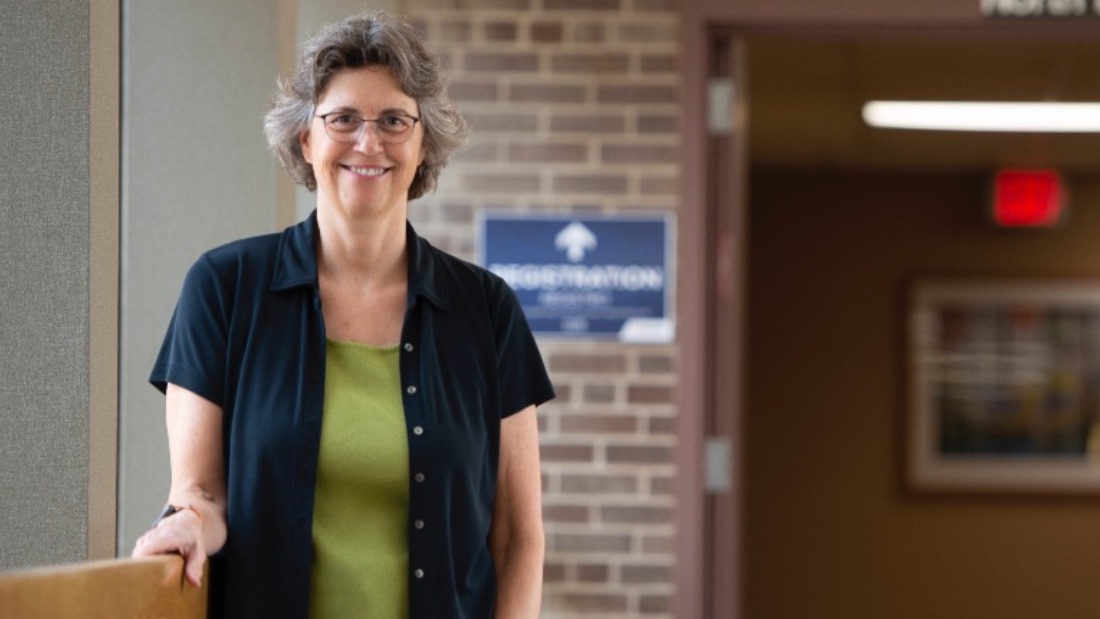
Sometimes the path to one’s life’s work presents itself clearly, without argument or ambiguity, and all one need do is step onto it. With her Harvard undergraduate degree in psychology years behind her, and her medical education and residency at the University of Wisconsin–Madison’s School of Medicine and Public Health (SMPH) just completed, Catherine “Katie” Kelley, MD, associate professor, General Pediatrics and Adolescent Medicine, took that step in 1989. As her pediatric residency concluded, Kelley’s teacher and mentor, M. Bruce Edmonson, MD, MPH, now professor emeritus, asked her if she would take over his SMPH Department of Pediatrics duties for a year as he took a leave of absence to obtain his Master of Public Health degree.
Kelley agreed, getting a year of full-on responsibility and a wide range of hands-on clinical and teaching experience in the bargain. She was classified as an instructor in 1989, cared for patients in the hospital and clinic, and mentored continuity clinic residents and medical students. When Edmonson returned in 1991, the Department of Pediatrics offered Kelley a continuing position on the faculty as an assistant professor. Thus began Kelley’s more than three-decade tenure of teaching and clinical service within the Department of Pediatrics, which will end on July 1 as she steps away to a well-earned retirement.
Her work has included supervising scores of pediatric residents, serving as preceptor to medical students, as well as developing and revising key clinics and courses. Much of her work greatly improved the quality and effectiveness of newborn pediatrics education at the Department of Pediatrics and nationally.
Kelley is quick to explain that teaching newborn pediatrics was very different in the mid-1990s: “At that time, pediatricians were primarily seeing their patients at the hospital before clinic started. It was not always easy for residents to be involved in this process, and teaching was definitely hit or miss.” Kelley volunteered to see newborns in the morning and arranged to let pediatric residents to come through at that time.
To address teaching and clinical process difficulties, she developed a Normal Newborn Curriculum. It allowed residents and medical students to learn how to care for newborns from a primary care perspective, while improving efficiency for faculty members. In both 1994 and 1995, Kelley was honored with the “Outstanding Clinical Teacher Award,” conferred by the pediatric house staff.
Her work included a national survey of 237 known residency programs to gather data on how residents were learning normal newborn care. From the survey data and her own extensive experience, Kelley developed a newborn nursery curriculum for pediatric residents and medical students at a time when the teaching of normal newborn topics was incomplete and inconsistent. Her comprehensive curriculum included sections on breastfeeding, jaundice, “important unique physical exam features in newborns,” as well as newborn blood screening and circumcision.
Kelley included case studies and discussion questions to engage residents and check their knowledge and thinking. Her newborn nursery curriculum was recognized in 1997 by the American Academy of Pediatricians (AAP) with the AAP Professional Education Award, an honor bestowed on a pediatrician for the development of an innovative and effective project for pediatric education.
Kelley’s teaching and mentorship within the pediatric continuity clinic may have had the most lasting effects on her pediatric residents. “Continuity clinic is the only longitudinal experience for residents to learn how to care for patients over time,” explained Kelley. “All pediatric residents participate. Each is assigned a mentor, and they meet a half day per week for their entire residency.”
Kelley has mentored approximately 50 residents. This pedagogical construct allows residents to see families adjust and evolve over three years as their child develops. The continuity between resident and mentor encourages trust and ongoing discussions, generating important role modeling and critical thinking. Kelley went further when she became Associate Residency Program Director in 2004. She enhanced continuity clinics with Continuity Clinic Immersion month and a continuity clinic “case of the month.” Said Kelley, “This was in response to an expressed need for more formalized coverage of general pediatric topics in the continuity clinic setting.”
In May 2019, Kelley received the UW Health Patient and Family Experience Provider Champion Award, which recognized Kelley as exemplary in her efforts to include patients in decisions about their treatment. She previously received this award in 2013; her dedication to her patients is always central to both her clinical and pedagogical approach.
Most recently, Kelley worked with a Bright Futures workgroup revising the organization’s age-specific guidanceprovided to families at pediatric well child visits. The revisions for the fourth edition included social determinants of health and an emphasis on lifelong physical and mental health.
Ellen Wald, MD, Alfred Dorrance Daniels Professor and chair of the Department of Pediatrics, praised Kelley’s long service to the Department: “Dr. Katie Kelley has been a dedicated and superbly effective teacher, mentor, and clinical role model to her pediatric residents and medical students for over 30 years. Caring, engaged, perceptive, and knowledgeable, she has always placed the patient and family at the center of her clinical efforts. Her development of curriculum greatly improved pediatric residents’ training here and nationwide. She leaves us with our profound gratitude.”